As the tendering process for £4 billion worth of contracts over ten years gets under way, asylum campaigner John Grayson examines the market for asylum seekers’ housing in the UK.

G4S dumps toddler with rare cancer in dirty asylum house with rats in the yard. Can G4S be trusted to be given part of the new £4 billion ten-year contracts for asylum housing across the UK from 2019?
Daisy is two and a half years old and has suffered from a rare skin and lung cancer since she was born in Sheffield. She was improving after chemo, then her family claimed asylum and sought accommodation. The family of six, from North Africa, were dumped in a house near the motorway on the outskirts of Sheffield on 25 October.
Daisy’s father attended a weekly ‘drop in’ for refugees in central Sheffield, on 1 November, bringing a letter to the ASSIST and Red Cross desks from one of the professionals caring for Daisy. She said that Daisy’s breathing had deteriorated as a result of being moved into the house:
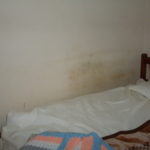
‘Her disease leaves her vulnerable to serious chest infections and wheeze which compromises her breathing … The age and crumbling state of the house, including a damp bathroom and damp in some of the bedrooms, crumbling walls and dirty carpets mean that this is not good for Daisy’s lungs.’
When ASSIST volunteer worker, Catherine, told me about the house I immediately recognised it as the house I had visited in September 2016.
Jean, her husband and three small children, also from North Africa, had been living there then, for six months, from April 2016. Jean had shown me the rat poison boxes in the back yard, and the fence gnawed by rats. ‘My children cannot play here, they are frightened of the rats,’ she said. Along with the rats, I was told about ‘water leaks, unsafe flooring, and damp walls.’
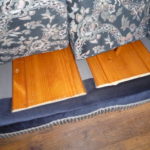
On 2 November 2017 I went to the house and was welcomed by Paul, Daisy’s father. ‘This place is dirty, it needs repainting. The carpets are dirty, but G4S will not let us replace them with the clean ones we have with us.’ Hazel, Daisy’s mother, showed me the crudely repaired settee in the living room, which G4S had provided. Paul showed me damp and crumbling plaster behind the settee , and damaged and crumbling paintwork on the stairs. There were dirty walls in the bedroom where Daisy slept. In the attic bedroom, where Paul’s sons slept, he opened one of the two unsecured panels in the walls, which led to dusty and dirty attic spaces.’My children say they can hear the rats in the walls. I have certainly seen the rats in the yard; this morning for instance.’
I went out into the yard which I remembered from last September – the family had sent me a video clip showing a rat running across it.
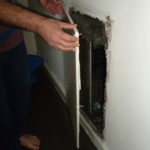
I have worked alongside refugees, and their families, in G4S asylum housing, over five years, but even I really could not believe that G4S could have put Daisy and her family in that house, knowing the state of the property … and about the rats.
But the evidence was clear; the ‘visitation log’ showed two ‘inspections’, on 23 October and on the morning of 25 October before the family were moved in. There was ‘cleaning’ on 24 October by Globe, the G4S cleaning contractor, and some ‘repairs’.
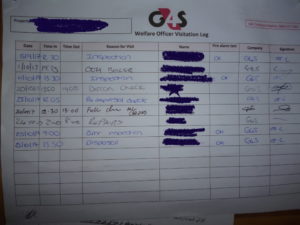
After I left the house, I rang the G4S manager to protest directly, on behalf of the family. ‘The Home Office checked that property before the family were moved in,’ he claimed. ‘Yes, we know about the rats in the yard, that’s a continuing problem, but there are no rats in the house, John. The place has been redecorated.’

For the next few days, a coalition comprising the Red Cross, SYMAAG, Sheffield Council, and staff of the local MP Clive Betts, supported the family and bombarded the Home Office and G4S with demands to get the family moved. The family received a letter from G4S on 6 November saying they would be moved on Wednesday 8 November, – but no apology.
From the COMPASS contracts to the £4 billion AASC contracts
Earlier this year the Home Office set up its Asylum Accommodation and Support Transformation (AAST) procurement team. On 26 August a preliminary notice of contracts beyond 2019 was announced which suggested contracts would be offered worth £600 million per annum, and that ‘the duration of the AASC contract will be confirmed in due course.’ On 18 November contracts for asylum housing across the UK from September 2019 to September 2029 were formally opened for tender. The outsourced contracts are worth a staggering £4 billion of British taxpayers’ money. Bidders for the contracts were given just twenty-nine days, to 17 December, to register an interest.
It seems highly likely, even though there are seven contract areas offered (Northern Ireland is the smallest at £50 million, the North West and the South of England the largest with £900 million, all over ten years), that the likely bidders will be limited to corporations and large housing companies operating in asylum markets across the EU, like the present holders of the UK COMPASS contracts: G4S, Serco and Clearsprings.
‘The standard of accommodation provided to asylum seekers has improved since 2012’
There are other indications that the three holders of the COMPASS contracts, or other private contractors like them, may well be the government’s preferred companies for delivery of the new contracts. On 31 January 2017, the latest UK Home Affairs Select Committee report on Asylum Accommodation provided by G4S, Serco and Clearsprings, was published, which found, ‘vulnerable people in unsafe accommodation … children living with infestations of mice, rats or bed bugs, lack of health care for pregnant women … inadequate support for victims of rape and torture.’
On 9 November 2017, nine months on, the government finally gave its response to the committee’s findings and recommendations. The government rejected the findings and recommendations wholesale, and claimed that the ‘the standard of accommodation provided to asylum seekers has improved since 2012.’
A torrent of criticism since 2012
Hundreds of asylum housing tenants have spoken to me and other campaigners about conditions in asylum housing in my pieces for Shine a Light on OpenDemocracy.net and for the IRR’s News Service.
G4S tenants and former tenants in Sheffield worked with film makers Brass Moustache to produce The Asylum Market to highlight alleged intimidation of tenants. G4S stepped in and prevented the BBC’s Victoria Derbyshire Show showing clips of the film on the day the 2017 Home Affairs Committee report was published.
In 2013 the Refugee Council and the Maternity Alliance issued their report, When Maternity Doesn’t Matter: dispersing pregnant women seeking asylum, based on interviews with twenty women many in COMPASS contract housing.
In Scotland, the Scottish Refugee Council published, The Extent and Impact of Asylum Accommodation Problems in Scotland in 2014. In 2016, in Glasgow, in Serco’s COMPASS contract area, Red Cross researchers spoke to pregnant asylum seekers and new mothers in their report A Healthy Start?. They found that:
‘The state of carpets preoccupied several of the women with young babies who were about to crawl and spending quite a lot of time on the floor. Living in a dirty, cramped house meant that many of them were not feeling able to relax and feel at home. Several lived on upper floors, which caused difficulties when trying to carry a baby, a buggy and bags of shopping up several flights of stairs.’
In Northern Ireland in November 2016, Northern Ireland Community of Refugees and Asylum Seekers (NICRAS) published a critical report, Home Sweet Home? on the Serco asylum housing contract.

The plight of asylum seekers living in substandard accommodation rarely excites national media attention, but on 20 January 2016, there was a front page story in The Times about asylum seekers’ front doors being painted red by Jomast Developments, the G4S contractor, in the North East, which was followed up across the national media and provoked questions in Parliament and special hearings of the Home Affairs committee. At one of these hearings on 26 January 2016, Labour MP Chuka Umunna told Stuart Monk, owner of Jomast: ‘You buy up cheap homes in some of the most deprived communities and you’re making money out of housing some of the most vulnerable and poor people, in some of the most deprived and poor places in our country. It looks like you profit from deprivation and people’s need for refuge – which to many people seems to be unseemly and unsavoury.’
From June 2012, when the COMPASS contracts started, to the deliberations of the 2016/2017 Home Affairs inquiry, there were four official inquiries featuring asylum housing in Parliament:
- The Children’s Society Parliamentary inquiry in 2013, when Sarah Teather MP chair of the inquiry said that asylum seekers ‘are treated as luggage rather than people who deserve some dignity and respect’. In the report, Teather also pointed to examples of ‘abject disregard for basic human dignity demonstrated by housing providers.’
- A Home Affairs committee report from its inquiry, later that year, noted: ‘We were very concerned by the description of the substandard level of housing provided to asylum seekers.’
- In January 2014 the National Audit Office reported: ‘Both G4S and Serco took on housing stock without inspecting it . . . many of the properties they had taken on did not meet the contractual quality standards.’
- The Public Accounts Committee followed up in April 2014: ‘The standard of the accommodation provided was often unacceptably poor and the providers failed to improve quality in a timely manner.’ And ‘Contractors have remained slow in providing decent accommodation for a very vulnerable group of people.’
In 2016, G4S was fined £5.6 million for the standard of the asylum housing it provided in 2013/14. G4S paid no UK corporation tax in 2012.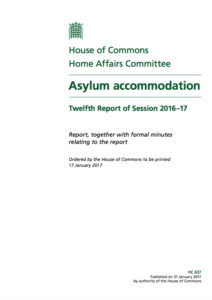
On 8 December 2016, the government quietly issued a written ministerial statement confirming that the Home Office had extended the existing COMPASS contracts, and that it was going to pay more — though not how much. ‘I have increased the amount of money that the Home Office pays for the provision of welfare officers and staff property management,’ wrote immigration minister Robert Goodwill.
As for the five years’ torrent of criticism and compelling evidence of rats, cockroaches and bed bugs. Goodwill brushed them all aside with the comment: ‘There has been considerable interest in the accommodation and support that is provided to asylum seekers,’ adding that he had ‘listened carefully’ to concerns.
A global auction for the AASC contracts?
In the international asylum, detention and prisons market, as Donna Red Wing pointed out in 2010, ’every prisoner (is) a profit centre, every immigrant a business opportunity.’
In 2012, in the lead up to the allocation of the COMPASS contracts, there was a competitive online auction, revealed in a High Court judgment here, when Jomast Developments took G4S to court. Regional consortia of local councils were faced with exclusion from the auction because they could not offer to deliver a contract across the UK, and their preliminary bids were too high for the final auction. This time around there will be seven separate regional contracts over ten years but it is highly unlikely public housing bodies will be interested. The possible exception is in Northern Ireland, where the Northern Ireland Housing Executive currently provides COMPASS asylum housing as a subcontractor from Serco.
It may well be that two of the three COMPASS contractors, G4S and Serco, will see themselves as well placed as the existing contractors in wider UK asylum markets, with contracts in linked detention centres (G4S at Brook House and Tinsley House at Gatwick, and Serco running a seven-year contract at the controversial Yarl’s Wood detention centre). Both companies have recruited establishment figures over the past few years. Rupert Soames, grandson of Winston Churchill, is CEO of Serco, one of the corporations providing asylum housing, in June 2015, he told BBC radio that the new outsourcing market: ‘makes Britain now to public service provision what Silicon Valley is to IT.’ In the first three months of 2016, new public sector contracts worth £1.35 billion were announced in the UK, sixty-five per cent of all outsourced contracts in the British economy. Serco has been a military contractor to the UK government. In March 2016 the Serco website proclaimed:
‘From our inception in 1950 to our expanded role today, using unique skills and expertise we provide UK Government with national nuclear security solutions, and we continue to play a vital role in the national interest … we provide and maintain warheads for the Trident system.’
In 2009, John (now Lord) Reid, a former Labour home secretary and defence secretary, while still a serving as an MP, took a £50,000-a-year consultancy role at G4S. G4S board members have included Lord Condon, former Commissioner of the Metropolitan Police and Adam Crozier, head of Independent Television (ITV). Current G4S chairman, John Connolly, who was once Britain’s highest paid accountant, and global chairman at Deloitte — also chairs the board at the Great Ormond Street Hospital charity, and was an advisor to Boris Johnson when he was the Mayor of London,.
In any procurement process perhaps the Home Office ought also to consider the fact that both G4S and Serco were caught out ‘overbilling’ the taxpayer under contracts for monitoring offenders — the tagging scandal. Both had charged the Ministry of Justice for applying electronic tags to ex-offenders who were not tagged. Some were in prison. Others were dead. Serco agreed to pay £68.5 million back. G4S offered to pay back £24.1 million but this was rejected by the Ministry of Justice and G4S eventually agreed on nearly £110 million. The Serious Fraud Office has had both companies under criminal investigation since November 2013.
Are other bidders possible?
International asylum markets, since 2012, have become more crowded and a company like the Swiss-based ORS Service company, with asylum camps and accommodation in Switzerland, Austria and Germany, bought in 2013 by Equistone Partners Europe Ltd, an asset management offshoot of Barclay’s bank, would be perfectly capable of bidding for the UK contracts.
In the US the Trump administration has reversed the policy of Obama who slowed down the privatisation of prisons, detention centres and military spending, and market predictions suggest that G4S is set to benefit from Trump’s spending plans. Also in the US the GEO Group, which operates dozens of private prisons and detention centres, is now getting new detention centre contracts. In April 2017, GEO won a $110 million contract to build a 1,000-bed immigration jail in Texas. The Geo Group UK Ltd has also developed asylum markets in the UK with detention centre contracts at Harmondsworth, and Dungavel in Scotland. The group also has a tie-up with UK company Amey, owned by Spanish corporation Ferrovial. Ferrovial also bought UK company Enterprise in 2013, a company with a history of outsourcing and social housing partnership contracts with over sixty local authorities, and integrated it into Amey. Amey currently operates a twenty-five year ‘Streets Ahead’ highways contract in Sheffield. The GEOAmey partnership company has UK government contracts for prisoner and youth offender transport and court cell suites, transporting 10,500 prisoners a year with 2,500 staff and 400 vehicles. It is perhaps not impossible that GEO/Ferrovial might be interested in a £4-billion, ten-year Home Office asylum housing and transport contract.
Campaigners will continue monitoring the tendering process and to try to ensure that asylum tenants are offered accommodation in future contracts of a ‘decent homes’ standard. This was the standard the Home Office included in the COMPASS contracts – but never enforced.
Related links
South Yorkshire Migration and Asylum Action Group (SYMAAG)
IRR News: ‘I killed three … maybe four rats in my kitchen this summer’
IRR News: The shame of asylum housing of child refugees in the UK
IRR News: The Corporate Greed of Strangers
IRR News: G4S and housing abuse of asylum seekers – the truth emerges
IRR News: G4S, Jomast Stockton hostel and the mother-and-baby-market

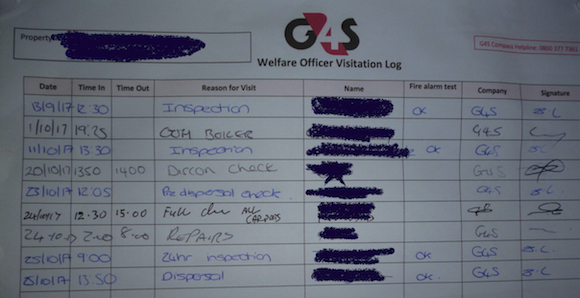
An absolutely damming report well done John Grayson for keeping up the protests, shame on this Government if they YET again issue G4S a lucrative contract when there is overwhelming evidence of neglect, incompetence, and extortion of public funds.
Max Senior (chair of Barnsley Amnesty International brach).
This needs wider publicity. Send it to the Guardian!